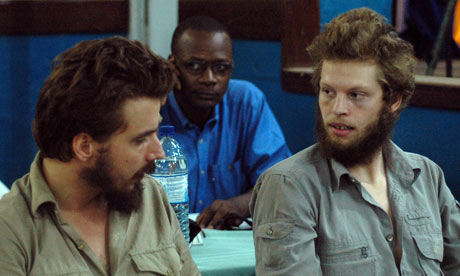Interesting article, but I noticed that there was no mention of CSS Global and their latest contract with the Somali government? Security contractors running around and providing protection to Somali government officials, tends to get noticed by the people, and I wonder if anyone in DC or any other think tank has thought about this latest deal?
Maybe CSS Global can pull it off, and do really well. Although I wonder why a more well known company with more proven capacity wasn’t chosen for this daunting task? Islamic extremists read the paper too, and you can bet they have some welcoming gifts ready for any company wanting to come in and do this kind of work.
The biggest advantage any group has in Somalia, is to reawaken the Blackhawk Down syndrome we have in regards to Somalia. To make operating there, a living nightmare, and make it very public and bloody. That is what they like to do in failed states, and warfare is sport in Somalia.
The other angle, and this is classic guerilla warfare, and that is to create a Blackwater Bridge scenario. Kill some contractors, drag their bodies through the streets (a la Blackhawk Down style), and then hang them up for the world to see on some telephone pole or bridge. The intended result is to get us angry, rally the fighters, recruit more guys, infuse doubt within the people about the foreigner’s capability and try to suck the foreigner into a country with actual ground troops as opposed to just contractors. They want us to go in there and kick ass, or at least try to, because that only rallies the people around the ‘wannabe’ home team. Or at least that is what Al Shabab is thinking.
Or maybe that is our intention? Allow a company with little experience and capability into a death trap like Somalia, and hope for a Blackwater Bridge scenario? No troops would be killed–just security contractors. But those contractors are American, and it would bring attention to the situation there. It would make Al Shabab look like animals. Then we could use that as a means for getting more involved in Somalia. It sounds farfetched, but I keep going back in my brain about CSS Global and their background.
You need your Varsity teams for Somalia, and CSS Global is kind of the Junior Varsity of teams. Is this a matter of lowest bidder, or CSS Global selling Somalia on capability? Who knows, and maybe a CSS Global or State Dept. representative can explain what is going on here? I want to believe that they are the best for the job, but their history really doesn’t point to that. Am I off base here? Let me know what you guys think? –Matt
——————————————————————
In Somalia, A New Template for Fighting Terrorism
10/17/2009
Jeffrey Gettleman
The New York Times
Somalia isn’t just a nagging geopolitical headache that won’t go away. It is also a cautionary tale. Few countries in modern history have been governmentless for so long, and as the United States has learned, it would be nice to think you could ignore this wild, thirsty, mostly nomadic nation 7,000 miles away. But you can’t.
Al Qaeda is working feverishly to turn Somalia into a global jihad factory, according to recent intelligence assessments, and the way the United States chooses to respond could serve as a template for other fronts in the wider counterterrorism war. Just last month, American helicopters swept over the dusty Somali horizon to take out Saleh Ali Saleh Nabhan, a wanted Qaeda suspect who had been hiding out in Somalia for years and training a new bevy of killers; some of those trainees are believed to be Somali-Americans who could easily slip back into the United States and do some serious damage as suicide bombers.
In a way, the daring daylight strike against Mr. Nabhan, which was supposedly part of the Obama administration’s shift from targeting terrorists with cruise missiles that often kill civilians, was a flashback. Few in Somalia — or the American military — have forgotten Black Hawk Down, the battle in October 1993 when Somali militiamen in flip-flops killed 18 American soldiers, including members of the Army’s elite Delta Force. It was a searing humiliation for the Pentagon, which had just emerged from the first gulf war pumped up on smart bombs and laser-guided missiles, but in Somalia found itself back in a Vietnam-style quagmire where high technology was no match for local rage.
Black Hawk Down made the United States gun-shy for years, contributing to its failure to intervene against genocide in Rwanda and, for a time, in Bosnia, too. The battle itself was immortalized in a so-so film and a great book — required reading for some courses at West Point.
